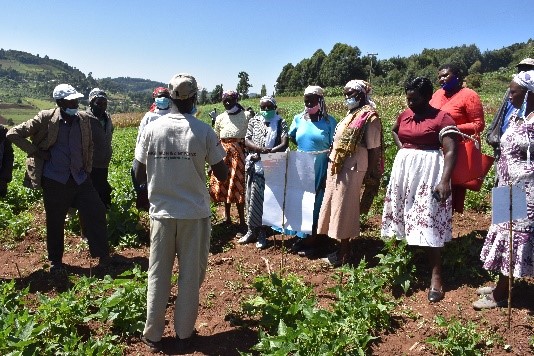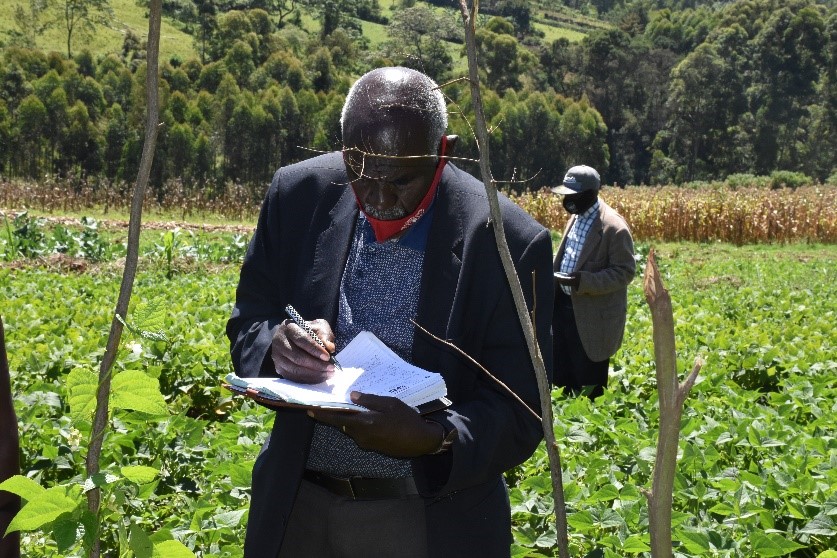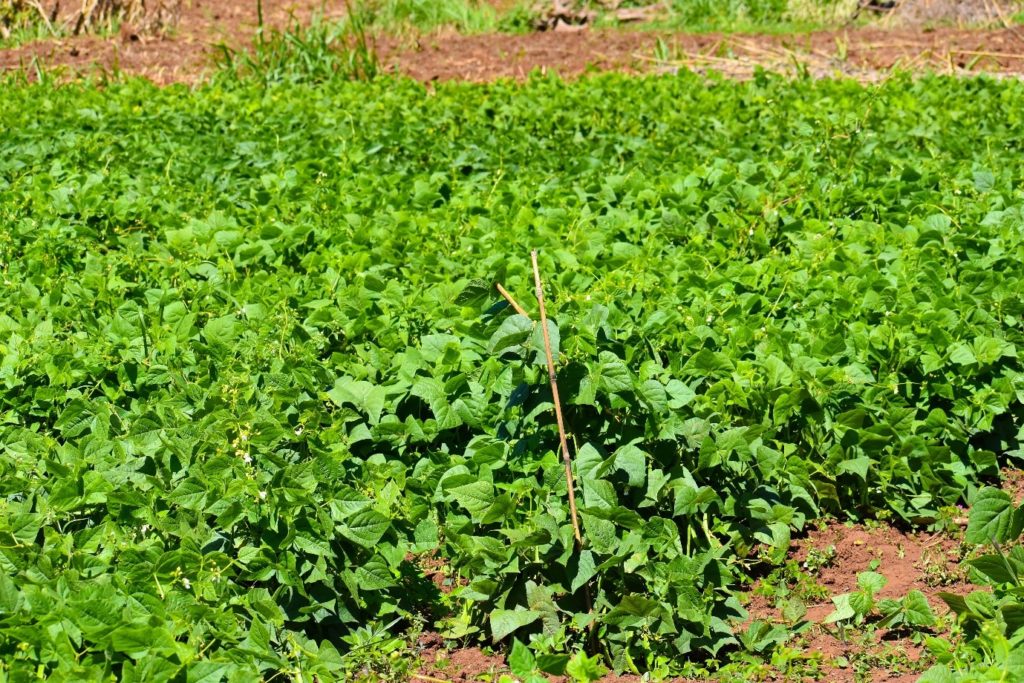By: Owen Kimani, Boaz Waswa, Justin Mabeya and Josey Kamanda
On the undulating landscape of Omobirona village, Nyansiongo Ward, Nyamira County, in Kenya, is a healthy bean crop planted to showcase the newly released high iron and zinc bean varieties; Angaza, Faida and Nyota. Thirsty for knowledge, farmers are seen trickling in for a field day to learn about the nutritious beans, how best to grow them and the market opportunities they can tap into. The field day, organized by the Alliance of Bioversity International and CIAT (Alliance) – through Pan Africa Bean Research Alliance (PABRA) – in partnership with the County Government of Nyamira, the Kenya Agricultural and Livestock Research Organization (KALRO), the Cereal Growers Association (CGA) and Yara International has attracted participation from various stakeholders among them AgroZ Kenya, Syngenta Kenya Ltd, Kenya Biologics Ltd, Greenlife Crop Protection Africa, Royal Seeds, Twiga Chemicals Ltd, SeedCo Kenya and Agrofoods Trading Ltd.
The favourable weather conditions in Nyamira makes it one of the counties with great potential to produce beans. Most farmers have grown their traditional variety Onyoro – a low yielding and disease prone bean variety. This is changing as farmers start embracing the new, high yielding and nutrient-dense bean varieties recently released by KALRO through the support of PABRA. Kenya experiences between 20 -30% deficit in staple foods every year. Unfortunately, the overall national food production has not increased in tandem with population growth. Increased population has pushed a high demand for more food.
Micronutrient deficiencies among children is prevalent as 26% of children under five are stunted and 11% of them are underweight.
“Here in Nyamira County, we are encouraging the communities to embrace production and consumption of the micronutrient-rich beans as part of our nutrition-sensitive strategy to address anemia and stunting. Bean growing will also trigger economic empowerment.” Peris Mong’are County Executive Committee Member, Agriculture, Nyamira County remarked.
The newly released Angaza (rich in iron and zinc), Faida (rich in zinc) and Nyota (rich in iron and zinc) varieties are being promoted across the country through the Technologies for African Agricultural Transformation (TAAT) program funded by the African Development Bank (AfDB). These varieties have shown great growth potential in Nyamira and surrounding counties. Iron is necessary for physical growth, cognitive and mental development for children and reduction of anemia in women of reproductive ages.
The high iron and zinc bean varieties will contribute to Kenyan Government Big 4 agenda on the Food Security and Nutrition pillar as well as the SDG 2 addressing Zero hunger. Biofortification is a proven intervention that can boost the nutritive value of staple crops especially beans.
What it take to produce sufficient beans for both home consumption and trade
To promote adoption and uptake of these beans by farmers, series of on-farm demonstrations (demos) and field days have been organised to show the farmers the potential of these beans. “These on farm demos will show farmers the appropriate bean management practises. They will show farmers how to maximise their bean production from a subsistence to income generating crop.,” said Justin Mabeya, representative from the Alliance.
Mr. Mabeya also emphasized that having the right seed is a critical starting point for bean production. The seed of these new varieties are available from authorised seed producers at KALRO, Agriscope, Bubayi, SeedCo and Dryland Seed.
 Dr. Boaz Waswa a soil fertility specialist at the Alliance observed to achieve the full potential of beans, one needs to apply good agricultural practices. The emphasis was on the soil health and fertility, timely weed management, pest and disease management and adopting climate smart technologies to overcome the adverse impacts of climate change.
Dr. Boaz Waswa a soil fertility specialist at the Alliance observed to achieve the full potential of beans, one needs to apply good agricultural practices. The emphasis was on the soil health and fertility, timely weed management, pest and disease management and adopting climate smart technologies to overcome the adverse impacts of climate change.
Beans are not only consumed at home but can also be sold to generate income since they have a ready market. “We offer farmers competitive prices for their beans. Currently the demand is high and unfortunately, we have not been able to get sufficient quantities of beans from the farmers in our region. This has resulted in sourcing for beans outside the county. My market is here so I encourage farmers here to actively grow these beans and I will be happy to come and buy from here. said Brighton Marieng’a, Agro foods Trading Limited.
“Our coming together as a group is to pool our efforts together to improve bean production. Being in a group, we will be able to plan together, order our seed and inputs collectively making it cheaper for us in the long run. It will also help us bulk the grain at harvest into tradeable volumes and negotiate better prices as a group,” said Yabesh Orina, a farmer and group leader Borabu Bean Farmers.
Peris Mong’are County Executive Committee Member, Agriculture, Nyamira County encouraged the farmers to come together as groups and have collection centres as there is a ready market for the beans and high demand. “Our team from the county government will support this initiative by sending extension messages to the farmers and also support in growing the beans,” she added.
Jackline, a farmer from Borabu was thankful to the organizers for the opportunity to learn about bean production, in addition to tasting the cooked beans. She shared how tasty the beans were.
“We should all work together and build a partnership/alliance along the bean value chain that will drive a shared agenda. As PABRA and the TAAT-HIB Compact, we aim to not only promote the technologies that boost productivity but also nurture partnerships in the bean corridor to help farmers structure their production that is linked to the current market demand.” Dr Josey Kamanda, Project Coordinator, TAAT project


